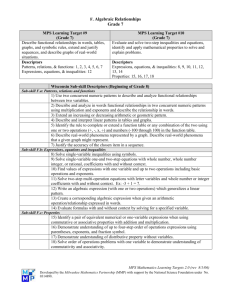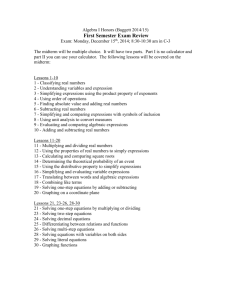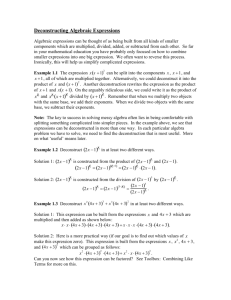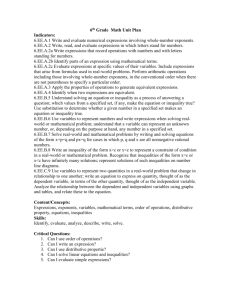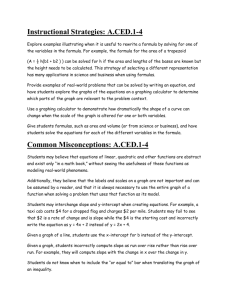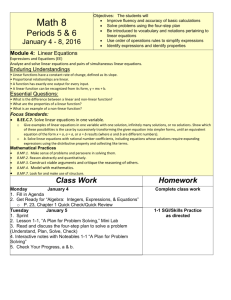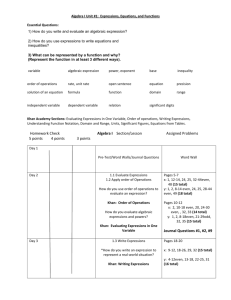Expressions and Equations - Alexandria Township School District
advertisement
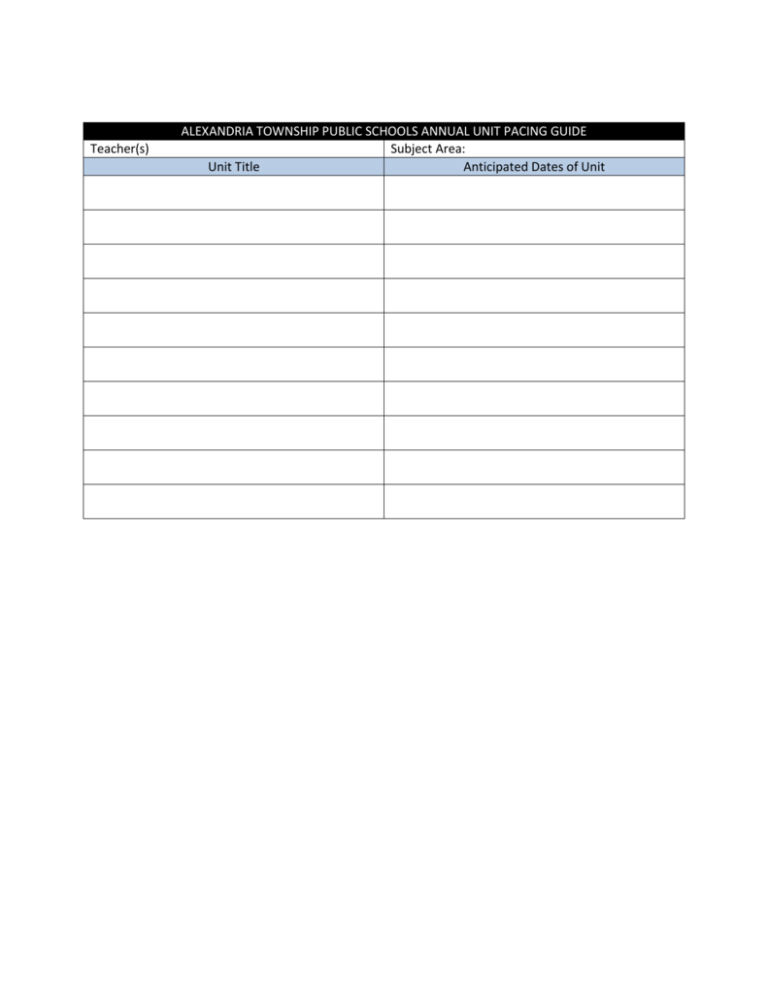
Teacher(s) ALEXANDRIA TOWNSHIP PUBLIC SCHOOLS ANNUAL UNIT PACING GUIDE Subject Area: Unit Title Anticipated Dates of Unit ALEXANDRIA TOWNSHIP PUBLIC SCHOOLS UNIT PLANNING TEMPLATE Teacher(s) Hoyda Grade Level: 6th Subject Area: Math (Expressions and Equations) Anticipated Length of Unit: 6 weeks Learning Targets Student Learning Objectives: 6.EE.A.1,2,3,4 Apply and extend previous understandings of arithmetic to algebraic expressions. 6.EE.B.5,6,7,8 Reason about and solve one-variable equations and inequalities. 6.EE.C.9 Represent and analyze quantitative relationships between dependent and independent variables. By the end of this unit of instruction, all students will…….. Know (facts, vocabulary) Understand (concepts) Be able to Do (skills) Exponents, Coefficient, constant, How to solve real world Evaluate numerical expressions variable, like terms, equivalent equations when all variables are following the order of operations expressions, commutative nonnegative, rational numbers (x including exponents properties, associative + p = q and px = q) properties, identity properties, Read, write, and evaluate equations, inequalities, solution How to evaluate expressions at algebraic expressions sets, infinity, dependent specific values of their variables variable, independent variable including exponents Identify equivalent properties used to determine equivalent The fundamental properties of expressions equality Find the solution to a one step Write expressions involving equation exponents, numbers, and variables Graph inequalities on a number line Write equations to express the dependent variable in terms of Analyze the relationship the independent variable between the dependent and independent variables in a table Write an inequality of the form and graph x>c or x<c to represent a constraint or condition of a real world problem Evaluate expressions at specific values of their variables including whole-number exponents Identify when 2 expressions are equivalent By the end of this unit of instruction, some students will……. Know (facts, vocabulary) Understand (concepts) Be able to Do (skills) Reflexive Property Transitive Property Symmetric Property Proofs How properties relate to the balance of equations Identify properties indicated in proofs Find solutions to multistep real world equations Apply properties of operations as strategies to add, subtract, factor, and expand linear expressions with rational coefficients Learning Experiences Critical Unit Questions: How can properties be used to form equivalent expressions? What is the difference between an expression and an equation? How are inverse operations used to solve for an unknown quantity? How can an inequality be represented on a number line? What is the relationship between the independent and dependent variable of a function? Unit Pre-Assessment(s): Model Curriculum Assessment Topics & Timeframe Exponents – 1 class Evaluating expressions with exponents – 2 classes Algebraic Expressions – 5 classes Properties of addition and multiplication – 1 classes Real World application – 3 classes Equations – 4 classes Inequalities – 1 class General Description of Instructional Activities Representing repeated multiplication and finding the value of exponential expressions Follow the order of operations to find equivalent expressions Identify parts of an expression Simplify combining like terms Simplify using the distributive property Writing expressions given verbal cues Evaluating expressions given values for the variable Commutative, Associative, and identity Properties Solve real world problems using algebraic and numerical expressions and equations Solving one-step equations Writing one-step equations from word problems Graphing solutions on a number line Representing real world situations as inequalities Formative Assessment(s) Observation of practice problems, Journal, Centers Observation of practice problems, Journal, Centers Observation of practice problems, Journal, Centers Observation of practice problems, Journal, Centers Observation of practice problems, Journal, Centers Observation of practice problems, Journal, Centers Observation of practice problems, Journal, Centers Equations with 2 variables – 3 classes Unit Post-Assessment(s): Test Understanding that a solution can be one number in a set of infinite possibilities Create a table and graph using an equation to generate solutions Observation of practice problems, Journal, Centers ALEXANDRIA TOWNSHIP DAILY LESSON PLANNING TEMPLATE Teacher(s) Date: Subject Area: Lesson Title: Learning Targets By the end of this lesson, all students will…….. Know (facts, vocabulary) Understand (concepts) Be able to Do (skills) By the end of this lesson, some students will……. Know (facts, vocabulary) Understand (concepts) Be able to Do (skills) Learning Experiences Description of Whole Class Experiences: Grouping Strategies: Differentiated Experiences Description of Process Exceeds Expectations Approaching Beginning Description of Formative Assessment Task(s): Description of Product ALEXANDRIA TOWNSHIP PUBLIC SCHOOLS UNIT REFLECTION FORM At the conclusion of your unit of instruction, please rate the degree to which you believe the unit met the following criteria. Unit Criteria Strong Moderate Weak Challenging content that required students to use higher order thinking and problem solving skills. Allowed for student choice. Provided varied activities designed to address different learning styles and preferences. Provided opportunities for student reflection and selfassessment Provided data that could be used to inform and adjust instruction to better meet the needs of varying learners. Fostered the use of technology as a tool to develop critical thinking, creativity and innovation skills. The next time this unit is taught I will……..

